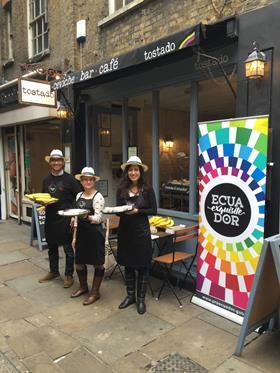
When the average person thinks of Ecuador, one imagines that thoughts of the Amazon rainforest, the Galápagos Islands, and Manchester United footballer Antonio Valencia would be the first to spring to mind.
In the fresh produce trade, of course, Ecuador is world-renowned for its banana supply. The South American nation is still believed to be the biggest banana exporter in the world, with around 25 per cent of global market share: “You can say that from four bananas eaten around the world, one is from Ecuador,” as Juan Carlos Yepez, trade officer with the Ecuadorean government trade body Pro Ecuador, likes to see it.
Yepez picks out two key criteria that he believes make Ecuador stand apart from its competitors in the category: “Ecuador is the only country with legislation that fixes banana prices internally,” he tells FPJ. “The fixing is done per year, and it involves growers, exporters and authorities. They all discuss the banana situation, international market, and any other relevant factors, and fix a minimum price for the banana box to be paid to the growers.
“This banana box minimum price fixing system is a very interesting thing. If you think about it, all our bananas are fairtrade in some ways. We have one of the highest minimum wages in the region.
“As well as that, Ecuador’s geographical position benefits our banana with sweeter taste and bigger sizes. Our bananas withstand more days in international transport.”
The market for Ecuador’s bananas is increasing, despite growers being hit by cold weather during the year, which has left export figures on a rung beneath those achieved in 2013 and 2014.
As well as the traditional markets of the EU, the US and Russia all taking their traditional large share of Ecuadorean bananas, exports are growing in other parts of the world, specifically the Middle East and China. Yepez notes: “Demand is growing, with China having requested more and more bananas for their increasing number of middle-class consumers, Turkey and the Middle East demanding more high-quality bananas, and the EU buying more, including the UK.”
Ecuador’s banana industry received a big political boost last week (w/c 23 November), when the European Parliament gave its approval for Ecuador to join the Free Trade Agreement the EU has with Colombia and Peru, subject to safeguards to protect European banana producers from Ecuadorean imports.
Members voted overwhelmingly in favour of a resolution to approve Ecuador’s accession, provided it agrees to a number of measures on issues such as sustainable development, deforestation and the rights of women and children.
Nevertheless, the parliament is seeking the inclusion of a mechanism allowing the European Commission to reintroduce tariffs if banana imports rise disproportionately and threaten EU production and jobs.
Bernd Lange, president of the European Commission, praised the Ecuadorean government’s efforts to create a more integrated society.
Meanwhile, at a more grassroots level in the UK, Pro Ecuador plans to increase its promotional work over the coming year. One aspect of the marketing will see the trade body running banana promotions with children at British soccer schools.
This campaigning could be conducted in conjunction with the aforementioned superstar footballer Valencia, as well as his namesake Enner Valencia, who also plays in the English Premier League with West Ham United.



